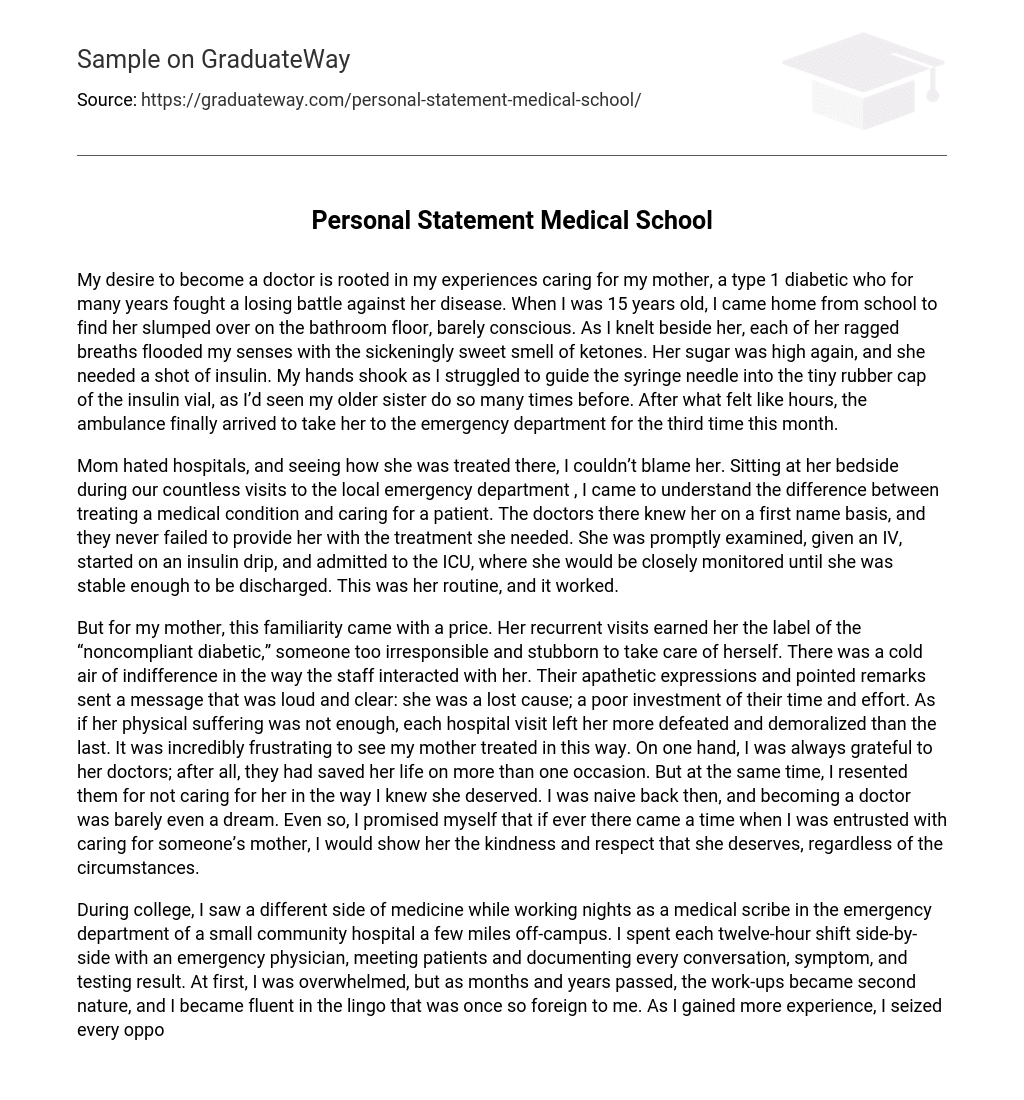My desire to become a doctor is rooted in my experiences caring for my mother, a type 1 diabetic who for many years fought a losing battle against her disease. When I was 15 years old, I came home from school to find her slumped over on the bathroom floor, barely conscious. As I knelt beside her, each of her ragged breaths flooded my senses with the sickeningly sweet smell of ketones. Her sugar was high again, and she needed a shot of insulin. My hands shook as I struggled to guide the syringe needle into the tiny rubber cap of the insulin vial, as I’d seen my older sister do so many times before. After what felt like hours, the ambulance finally arrived to take her to the emergency department for the third time this month.
Mom hated hospitals, and seeing how she was treated there, I couldn’t blame her. Sitting at her bedside during our countless visits to the local emergency department , I came to understand the difference between treating a medical condition and caring for a patient. The doctors there knew her on a first name basis, and they never failed to provide her with the treatment she needed. She was promptly examined, given an IV, started on an insulin drip, and admitted to the ICU, where she would be closely monitored until she was stable enough to be discharged. This was her routine, and it worked.
But for my mother, this familiarity came with a price. Her recurrent visits earned her the label of the “noncompliant diabetic,” someone too irresponsible and stubborn to take care of herself. There was a cold air of indifference in the way the staff interacted with her. Their apathetic expressions and pointed remarks sent a message that was loud and clear: she was a lost cause; a poor investment of their time and effort. As if her physical suffering was not enough, each hospital visit left her more defeated and demoralized than the last. It was incredibly frustrating to see my mother treated in this way. On one hand, I was always grateful to her doctors; after all, they had saved her life on more than one occasion. But at the same time, I resented them for not caring for her in the way I knew she deserved. I was naive back then, and becoming a doctor was barely even a dream. Even so, I promised myself that if ever there came a time when I was entrusted with caring for someone’s mother, I would show her the kindness and respect that she deserves, regardless of the circumstances.
During college, I saw a different side of medicine while working nights as a medical scribe in the emergency department of a small community hospital a few miles off-campus. I spent each twelve-hour shift side-by-side with an emergency physician, meeting patients and documenting every conversation, symptom, and testing result. At first, I was overwhelmed, but as months and years passed, the work-ups became second nature, and I became fluent in the lingo that was once so foreign to me. As I gained more experience, I seized every opportunity to emulate the physicians who had become my mentors. When we encountered particularly complex cases, I scoured the patient’s medical records for any hidden clues. I was thrilled to be part of the team, especially in the instances when I uncovered some detail that seemed minor to me, but turned out to be vital part of the decision-making process.
As I pursue training as a physician, my end goal is not to fix broken bodies, but to care for those in need; and sometimes, people are broken in ways no medicine can repair: like the father of three whose visit started with him feeling “a little run down,” and ended with a diagnosis of terminal metastatic brain cancer. Or the young mother whose four year-old son fell off a playground swing and “just seemed a little wobbly,” before he fell asleep on the hospital bed and never woke up. Standing at the bedside during these pivotal moments, I learned that sometimes a touch on the shoulder or a comforting embrace did more than any medicine could, just by showing them that they were not alone, and that the people who they had trusted to fix them would stay by their side, even when there was nothing left to fix.
Although I am not yet equipped to treat patients, my experiences caring for them instilled me with a sense of personal responsibility that drove me to push on during the times when circumstances put my commitment to the test. Working three or more nights a week while keeping up with my classes was grueling. I took exams going on 30 hours without sleep. Once, after a 20-hour shift, I fell asleep at the wheel and wrapped my car around a telephone pole, leaving me with no car and a bad concussion. There were times when I doubted my ability to succeed. But looking back, I am grateful to have had the opportunity to test my resolve, and prove to myself that I have chosen a career that will never fail to bring me purpose and fulfillment, even when things get hard. I know the road ahead of me is long, but I embrace the challenge; and I eagerly anticipate the opportunity to make good on the promise I made to myself standing at my mother’s bedside all those years ago: that as a physician, I would not just treat my patients, but care for them, and give my absolute and uncompromising best in every aspect of that care.





